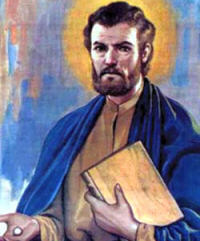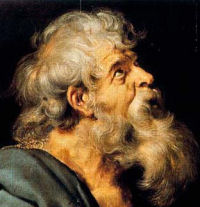» Enjoy our Liturgical Seasons series of e-books!
Today is the Feast of St. Matthias, Apostle and Martyr. After the Ascension of Jesus, St. Peter proposed to the assembled faithful that they choose a disciple of Christ to fill the place of the traitor Judas in the first missionary band. Lots were drawn, with the result in favor of Matthias. According to one ancient tradition, this missioner labored in Ethiopia and was martyred there. Thus did St. Matthias receive "the crown of life which God has promised to those who love him." The Church venerates St. Matthias on an equal footing with the other Apostles, whose voices resound throughout the world, from generation to generation, giving testimony of what they saw and heard in their life with our Lord. His name is mentioned in the Canon of the Mass.
Meditation for Wednesday of the Fourth Week of Easter:
The Good Shepherd
1. "I am the good shepherd." In the homily for the third nocturnal of the divine office for this Sunday, St. Gregory tells us that "The good shepherd laid down His life for His sheep that He might change His body and blood into our Sacrament, and that He might satisfy with the nourishment of His own flesh, the sheep which He had redeemed" (Homily of the third nocturn).
2. Just why did Christ wish to remain on earth under the appearance of bread and wine? Certainly He did wish to nourish our souls with the grace received in this sacrament. But He also had other reasons. By means of the Eucharist Christ found a means of transcribing all time and all space. Through the mystery of the Eucharist He provided a means whereby He could go on living and working among men just as He had done during His earthly career. Through this sacrament Christ continues and repeats all the acts of His private and public life. Just as He was once born in a little stable outside the sleeping hamlet of Bethlehem, so He is reborn each day on His altars throughout the world. Christmas is repeated each day in the Holy Sacrifice of the Mass.
Perhaps one might say that the second important event in the life of Christ was His manifestation of Himself to the world in the visit of the Magi. We are told that these Holy Wise Men from the East came seeking the new born King whose star they had seen, and that they found Him in the manger where He had been laid by the virginal hands of His Blessed Mother. Filled with joy they entered the stable and offered Him their gifts of gold, frankincense, and myrrh. This event is repeated now too, a thousand times a day, for the wise men of the world still come in search of Him, and they find Him where He has been laid by the hands of a virginal Priesthood, in the tabernacles of our altars. The gifts that they bring Him are the same: the gold of their love, the incense of their prayer, and the myrrh of their repentant hearts.
Perhaps nowhere does Christ so clearly demonstrate that He wishes to continue His role as the Good Shepherd as in His life in the Blessed Sacrament. One of the Evangelists says of Him, "He went about doing good." This would still be an excellent summary of what Christ does in the Eucharist. Just as He once mingled with the crowds in Jerusalem, Caesarea, and the cities and towns of Palestine, so today he goes about searching out the halt, the lame, the sick, the sorrowing and the dying in the great cities and the small hamlets of the world.
There is not a day of the year, nor an hour of the day when He is not being carried in the arms of His priests to visit the sick, the sorrowing and the dying. Sometimes at the favorite shrines of His Blessed Mother, such as Lourdes, Fatima, Sainte Anne de Beaupré, He still works the same physical miracles which He once worked in Palestine. But more often, daily even, He works spiritual miracles through His sacraments, restoring spiritual sight to those who have been blinded by the sophistries of the world, the power of spiritual hearing to those who have long been deaf to the voice of their uneasy consciences, and the power of contrite speech to sinners so that they can fall on their knees before His representatives and say, "Father, I have sinned before heaven and thee." Many a Magdalen still comes stumbling to His feet, disheveled and disillusioned, and is sent away with the same kind admonition, "Go now, and sin no more."
3. Principally, of course, the Eucharist is a representation and a repetition of His sacrificial death on the cross. The victim of this sacrifice is the same, and the principal Priest is the same. It is Jesus Christ, the Incarnate Son of God, offering Himself again to His Heavenly Father. But we are assured in the Canon of the Mass that this sacrifice is offered "calling to mind the blessed Passion of the same Christ, Thy Son, our Lord, and also His Resurrection from hell, and also His glorious Ascension into heaven."
For almost two thousand years now, men have been trying to bury Christ in a tomb of stone. But Christ will not stay buried, for through the mystery of the Eucharist He has found a means of rising from the dead. We may well imagine the chagrin, the surprise, perhaps even the despair of the Scribes and Pharisees when they learned that Christ had actually risen from the dead. When they were seeking a charge on which He could be put to death, the High Priest had told them, "If we let Him alone so, all will believe in Him, and the Romans will come and take away our place and our nation" (John 11:48). They feared Christ would cause them to lose the petty marble palaces in which they were living; they feared He would cut off the tribute of gold and silver they were collecting from the poor; they feared that He would arouse the Romans and endanger their limited national sovereignty. And now they knew the truth. The only palace in which Christ had ever wanted to dwell was the palace of the human soul; and the only kingdom He had ever wanted to rule was the kingdom of the human heart; and the only tribute He had ever sought was the tribute of human love. Pontius Pilate and the Scribes and the Pharisees are gone now, and sometime soon, all those who are still trying to drive Christ from the world He created, and to bury Him in a tomb, will all be gone. But Christ will be here fulfilling through the Eucharist that promise He made so long ago, "Behold, I am with you all days, even to the consummation of the world" (Matt. 28:20).
—Benedict Baur, OSB, The Light of the World, Vol. 2.
St. Matthias
Mathias was one of the first to follow our Savior; and he was an eye-witness of all His divine actions up to the very day of the Ascension. He was one of the seventy-two disciples; but our Lord had not conferred upon him the dignity of an apostle. And yet, he was to have this great glory, for it was of him that David spoke, when he prophesied that another should take the bishopric left vacant by the apostasy of Judas the traitor. In the interval between Jesus' Ascension and the descent of the Holy Ghost, the apostolic college had to complete the mystic number fixed by our Lord Himself, so that there might be the twelve on that solemn day, when the Church, filled with the Holy Ghost, was to manifest herself to the Synagogue. The lot fell on Mathias; he shared with his brother-apostles the persecution in Jerusalem, and, when the time came for the ambassadors of Christ to separate, he set out for the countries allotted to him. Tradition tells us that these were Cappadocia and the provinces bordering on the Caspian Sea.
 The virtues, labor, and sufferings of St. Mathias have not been handed down to us: this explains the lack of proper lessons on his life, such as we have for the feasts of the rest of the apostles. Clement of Alexandria records in his writings several sayings of our holy apostle. One of these is so very appropriate to the spirit of the present season, that we consider it a duty to quote it. 'It behooves us to combat the flesh, and make use of it, without pampering it by unlawful gratifications. As to the soul, we must develop her power by faith and knowledge.' How profound is the teaching contained in these few words! Sin has deranged the order which the Creator had established. It gave the outward man such a tendency to grovel in things which degrade him, that the only means left us for the restoration of the image and likeness of God unto which we were created, is the forcible subjection of the body to the spirit. But the spirit itself, that is, the soul, was also impaired by original sin, and her inclinations were made prone to evil; what is to be her protection? Faith and knowledge. Faith humbles her, and then exalts and rewards her; and the reward is knowledge.
The virtues, labor, and sufferings of St. Mathias have not been handed down to us: this explains the lack of proper lessons on his life, such as we have for the feasts of the rest of the apostles. Clement of Alexandria records in his writings several sayings of our holy apostle. One of these is so very appropriate to the spirit of the present season, that we consider it a duty to quote it. 'It behooves us to combat the flesh, and make use of it, without pampering it by unlawful gratifications. As to the soul, we must develop her power by faith and knowledge.' How profound is the teaching contained in these few words! Sin has deranged the order which the Creator had established. It gave the outward man such a tendency to grovel in things which degrade him, that the only means left us for the restoration of the image and likeness of God unto which we were created, is the forcible subjection of the body to the spirit. But the spirit itself, that is, the soul, was also impaired by original sin, and her inclinations were made prone to evil; what is to be her protection? Faith and knowledge. Faith humbles her, and then exalts and rewards her; and the reward is knowledge.
—Excerpted from The Liturgical Year, Abbot Gueranger O.S.B.
Symbols and Representation: lance; spear
Patronage: Alcoholism; carpenters; reformed alcoholics; smallpox; tailors; diocese of Gary; Indiana; diocese of Great Falls-Billings, Montana
Highlights and Things to Do:
- Celebrate the triumph of St. Matthias by reading the hymn taken from the Menaea of the Greeks.
- Learn more about St. Matthias:






